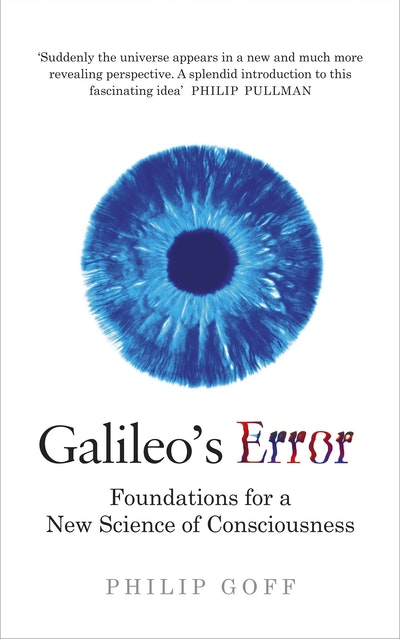- Published: 19 November 2019
- ISBN: 9781846046018
- Imprint: Rider
- Format: Trade Paperback
- Pages: 256
- RRP: $39.99
Galileo's Error
Foundations for a New Science of Consciousness
- Published: 19 November 2019
- ISBN: 9781846046018
- Imprint: Rider
- Format: Trade Paperback
- Pages: 256
- RRP: $39.99
This is one of the clearest accounts I've ever read about the mystery of consciousness, and the way in which one theory about it, panpsychism, does a great deal to explain how it occurs and what it is. Why shouldn't consciousness be a normal property of matter, like mass or electrical charge? This idea has the glorious simplicity of our first realisation that the earth goes around the sun, and not vice versa. Suddenly the universe appears in a new and much more revealing perspective. Philip Goff's book is altogether a splendid introduction to this fascinating idea.
Philip Pullman
Goff’s ideas are radical, but his arguments are rigorous and the book is a pleasure to read. I recommend it to anyone who wants to come to grips with mystery of consciousness.
David Chalmers, New York University
In this provocative, brave and clearly written book, Goff makes a compelling case for an initially absurd thesis.
Lee Smolin, Perimeter Institute for Theoretical Physics
In Galileo’s Error, Philip Goff argues for a new approach to the scientific study of consciousness. He offers an accessible and compelling analysis of why our felt experience continues to elude scientific explanation and why the theories that describe consciousness as a fundamental feature of matter have been neglected—and why they now deserve serious consideration. This is a must-read for anyone interested in the future of consciousness studies.
Annaka Harris, best-selling author of Conscious: A Brief Guide to the Fundamental Mystery of the Mind
Galileo’s Error is wonderful introduction to this ancient set of beliefs and how panpsychism can give rise to a naturalized form of spirituality that can overcome the alienation we all feel in today’s globalized world that is beginning to fracture
Christof Koch, President and chief scientist of the Allen Institute for Brain Science
Galileo’s Error is a tour de force. Goff defends his distinctive view of consciousness with verve, wit and authority, and for good measure adds an even-handed account of alternative views and a graphic introduction to the surrounding science. It is hard to imagine a better introduction to current debates about consciousness
David Papineau, King's College London/City University New York
Philip Goff has written an extraordinarily accessible and entertaining book introducing and defending an increasingly popular, if on the face of it outlandish, claim: that consciousness is everywhere. Matter doesn’t somehow magically become conscious depending on how it’s arranged; rather the consciousness is there from the start. There’s no better introduction to this fascinating subject
Stephen Law
Goff's elegant book offers a thought provoking, inspiring picture of the nature of mind. His spirited defense of panpsychism moves well beyond the usual academic discussions, mulling over our place in the larger universe
Susan Schneider, University of Connecticut
Galileo's Error is an exciting and provocative book, which argues for the revolutionary view that all matter is conscious. Goff writes with clarity and passion, and whether you agree or disagree with his conclusions, you will find his book enjoyable, engaging, and deeply thought-provoking
Keith Frankish, Honorary Reader in Philosophy, University of Sheffield
One of Goff’s many achievements in this book is that he makes the fundamental problem of consciousness vivid and comprehensible to non-experts ... it is packed with rich discussions in clear, charming, easily readable prose ... an admirable work
The TLS

